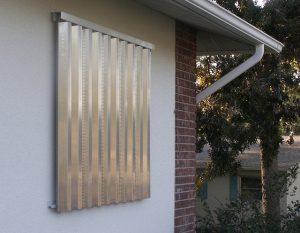
Aluminum shutters are one of the many preventative measures panhandle homeowners can include in their hurricane preparedness.
Photo: Carrie Stevenson
Hurricane Season in the Gulf and Atlantic begins June 1. For those of us who have lived in hurricane territory for some time, we all have our war stories of days without electricity and water, of being stuck in evacuation traffic, and of neighborhood camaraderie in the aftermath. Whether a newcomer or a native, it is always important to plan ahead and not be complacent about storm readiness. The last few summers have borne out the climate predictions of stronger storms, with many of our neighbors still struggling to dig out of the immense damage done by Category 5 Hurricane Michael last fall.
In this article, I will be paraphrasing a section from the well-done Homeowners Handbook to Prepare for Natural Hazards. A new version of this guide will be coming out soon, but I highly recommend the handbook (hard copies available at many Extension offices) for anyone living in Florida.
Tip #1: Gather your emergency supplies. Do this sooner than later—when a storm is in the Gulf with a trajectory towards your city is not the time to go shopping. Lines will be long, people will be stressed, and shelves will start to empty. Gather emergency supplies like water, canned goods, batteries, and flashlights (full list here) now, and restock monthly throughout the summer and fall.
Tip #2: Create a separate evacuation plan for natural events, such as hurricanes/tropical storms, tornadoes, floods, and wildfires. Northwest Florida is prone to all of these natural phenomena, and the plan required for each is different. For a tornado or tropical storm you will most likely shelter in place (unless your home is not secure in this situation), while fires, flooding, and strong hurricanes may require securing your home and leaving town.
Tip #3: Know you property and take appropriate action. Look at your location—if the land floods during a rain, consider flood insurance. If trees overhang your house, consider trimming or cutting branches that might damage your house in a storm. If the property has a high structural profile, it could be especially susceptible to wind damage in a hurricane.
Tip #4: Know your house and take appropriate action. When was your house built? Does it have connectors to tie the roof to the wall or the wall to the foundation? When will you need to reroof? Look at your blueprints—if you don’t have a copy, your homebuilder or local building department may have copies.
Tip #5: Strengthen your house. A house built after the early to mid-1990’s should have hurricane clips tying the roof to the wall and strong connectors from the wall to the foundation. If your house was built before then, you can still retrofit at a reasonable cost. Wind-rated garage doors, precut shutters, and replacing windows with impact-resistant glass can all protect your home. In the western Panhandle, 75% of retrofit costs can be covered through the Rebuild Northwest Florida wind mitigation program.
Tip #6: Utilize the State of Florida’s Hazard Mitigation Grant Program. This program can be used for a number of home improvements, including construction of a safe room for tornado shelter.
Tip #7: Insurance. Don’t gamble with your house. Obtain adequate wind, flood, and home insurance. Remember—if there is a hurricane in the Gulf, insurance companies will not issue windstorm policies.
Tip #8: Take advantage of potential discounts for your hurricane insurance premiums. Coverage may vary among insurance companies, so call you insurance agent to find out about discounts that may be available. Significant discounts may be provided for reducing the risk to your house with window protection, roof-to-wall tie downs, and wall-to-foundation tie downs.
Tip #9: Finance creatively. Consider efforts to strengthen your house as an important home improvement project. Most projects are not that expensive. For the most costly ones, a small home improvement loan and potential discounts from hurricane insurance premiums may make these projects within reach. It is a great investment to strengthen your house and provide more protection to your family.
Tip #10: Seek the assistance of a qualified, license architect, structural engineer, or contractor. There are some improvements that can be done yourself, but if you cannot do the work, seek qualified assistance through trusted references from friends and family and professional associations.
For more information, reach out to your county Emergency Management department or visit these IFAS Extension Hurricane Preparedness and Recovery resources.
- Hurricane Season 2025 - July 7, 2025
- The Striped Burrfish - April 11, 2025
- The Value of Biodiversity - March 28, 2025
